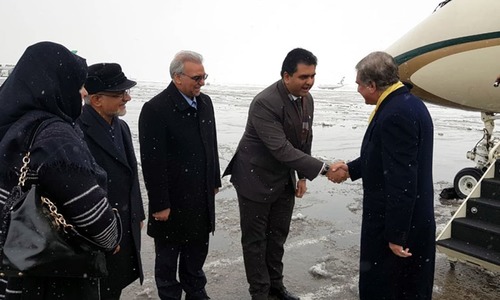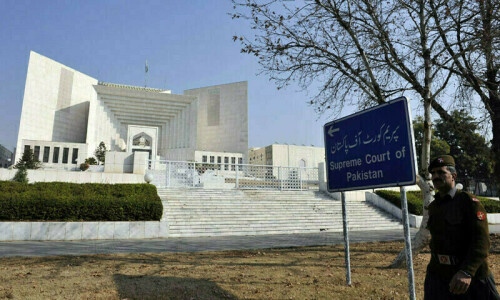THERE has been a sudden and orchestrated de-escalation of the Middle East crisis. Allegedly, ‘better sense’ has prevailed in Tehran and discretion is now the better part of valour! If so, this would be a massive win for Trump and the US, and a severe setback for the Islamic Republic of Iran, rendering it more vulnerable to domestic anti-government protests over national humiliation and the economic situation brought about by illegal US sanctions, which are an act of war. Nevertheless, avoiding a regional conflagration will be generally welcome.
But this could be a misreading of the situation. Iran has been united in grief, anger and determination. It has demonstrated the precision of its missile technology against Aramco in Saudi Arabia last September, although it denies responsibility for that attack. Iran still has active assets throughout the region. The current crisis may have been alleviated rather than defused. After the Iraqi parliamentary vote of 170 to 0 to expel US forces (many Sunnis and Kurds abstained), the US military presence in Iraq may become untenable. This could sooner or later lead to its exit from Syria, which would make Israel a much more aggressive and destabilising factor. This would elicit Russian and Turkish responses. Retaining a military presence in Afghanistan may also become much more difficult for the US.
The US act of war against both Iran and Iraq and its designation of Iran and China as enemies will ensure greater Chinese and Russian determination not to allow regime change in Tehran, nor Afghanistan to become a base for US strategies against them. Indirectly, this could strengthen the Taliban against a pro-US Kabul regime, even if both Russia and China will want a more moderate Taliban to agree to a power-sharing arrangement with a much less pro-West Kabul.
Whereas the US may have gained temporarily, it stands to lose in the longer run unless it is able to fashion a more balanced and coherent, and less kinetic and pro-Israel policy towards Iran and the Middle East. In this regard, Trump may be less of an obstacle than Corporate America, US generals, right-wing white populists, and Christian evangelists.
A mediatory role for Pakistan in the US-Iran conflict could be advantageous for various reasons
Reports that the US suggested Pakistan play a mediatory or tension-reducing role between the US and Iran, if confirmed, would be welcome. It could provide leverage for Pakistan to moderate India’s calamitous policies in Kashmir and improve the economic environment for Pakistan to get on to a faster growth path. It could complement a similar role in Afghanistan.
For Pakistan to be able to play such a role, it would have to build trust with its interlocutors, strengthen its own stability through the quality of its governance, and demonstrate a capacity to follow an independent foreign policy. This will require the kind of leadership Pakistanis have yearned for since the departure of their country’s founding father.
Why the US obsession with Iran? According to Noam Chomsky, during World War II the US initially assumed Germany would win the war. Accordingly, its post-war ‘Grand Strategy’ envisaged taking over a ‘Grand Area’ comprising the Western Hemisphere, the former British Empire and the Far East. Germany was expected to dominate much of Eurasia. But at Stalingrad and Kursk, the German armies were stopped. The US revised the Grand Area to include “control of Middle East oil resources”.
After the war, the British and the Russians vied for control of Iran. Britain prevailed and Iran became its client state under the Shah. However, the nationalist prime minister Mohammed Mossadeq nationalised Anglo-Iranian Oil. Britain sought US help. The CIA engineered a military coup. The Shah who had fled Iran returned. Iran, Israel and Saudi Arabia became the three pillars of western control of the region and its resources.
Following the Islamic Revolution in Iran, the US tried to implement a military coup to restore the Shah’s regime. It failed. An extended Iranian siege of the US embassy in Tehran followed during which a US military attempt to rescue the hostages also failed. The US has never forgiven Iran.
It encouraged Saddam Hussein to launch the Iran-Iraq war. After eight bloody and wasted years it was brought to an end by the US shooting down of an Iranian commercial flight killing 290 people. The US dubiously described the shooting down as “accidental”. Earlier it had falsely blamed Iran for Iraq’s use of chemical weapons against Iraqi Kurds. It imposed sanctions against Iran and invited Iraqi nuclear engineers to the US for advanced training in nuclear weapons production!
Nevertheless, the Islamic Republic of Iran supported the US war against the Taliban and al-Qaeda in Afghanistan and against the Baathists and Daesh in Iraq. Moreover, according to US intelligence agencies, Iran had stopped developing nuclear weapons. Iran also supported a Nuclear Weapons Free Zone in the Middle East, which should have allayed suspicions. But the US opposed a NWFZ/ME in order to protect Israel’s regional monopoly of nuclear weapons and to cover its own illegal facilitation of Israel’s nuclear weapons development.
In 2015, President Obama agreed to a nuclear deal with Iran: the Joint Comprehensive Plan of Action. EU countries confirmed Iran was in compliance with the JCPOA. Nevertheless, President Trump withdrew from the deal and reimposed crippling sanctions — in fact, a near total embargo against Iran which is a crime against the people. The US accused Iran of spreading its influence in the region through its terrorist proxies.
The real reason was Iran’s prioritising the use of its oil resources to serve its national interests and counter US regional hegemony instead of supporting US strategic interests and accepting Israel’s criminal aggression against the Palestinians and other Arab countries. Iranian ‘strategic defiance’ was a ‘virus’ which could infect the entire region. It had to be eliminated — if necessary, by regime change.
The depth of US hostility and the tenacity of the Iranian revolution will ensure regional instability for some time yet. The mystery of the plane crash could complicate matters. Hopefully, the PM can play more than a symbolic role.
The writer is a former ambassador to the US, India and China and head of UN missions in Iraq and Sudan.
Published in Dawn, January 13th, 2020














































